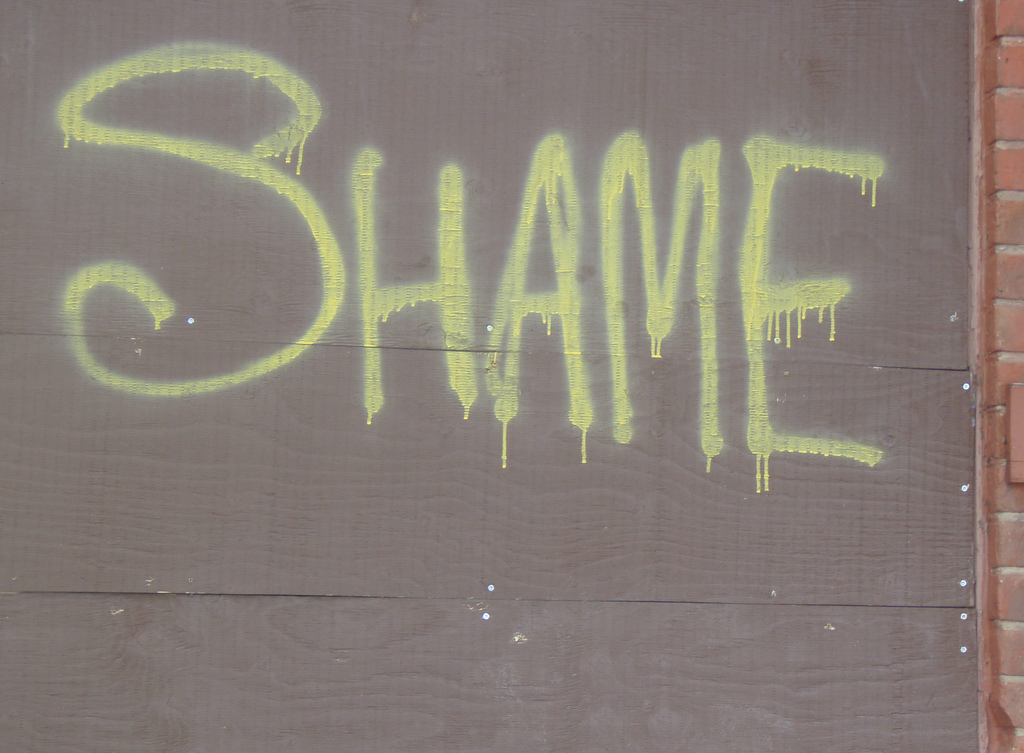
The first observable evidence of mankind’s Fall was the presence of shame. It manifested in the first couple’s fear-soaked shrinking from the presence of God. The sound of His footfalls had only the previous day filled their hearts with joy and caused them to come running to meet them in glad anticipation. Now His footsteps filled them with dread.
Father God had not changed. But they had.
“I was afraid.”
“Because I was naked.”
“And I hid myself.”
Shame had wrapped its filthy tentacles around their souls. So, the first couple hastily contrived some Man-conceived, Man-crafted way to cover that shame. Religion was born. And over the subsequent millennia the sons of Adam and the daughters of Eve would devise ever more clever and sophisticated ways to try to cover that shame. But “cover” was the best they could do.
In the Old Testament we find two key Hebrew words for shame—but these words communicate two very different concepts. The word bosheth connotes the guilt and dishonor we experience when our sin is exposed. Daniel used this word when he said, “”Righteousness belongs to You, O Lord, but to us, open shame . . .“[1] It is bosheth, in part, that drove Adam and Eve to flee the presence of God. And every person alive has felt its sting.
There is another Hebrew word for a very different type of pain—one that is also usually translated “shame” or “ashamed” in our English Bibles. It is kalam and it speaks of being hurt, rejected, insulted, disgraced, defiled or humiliated—sometimes in public and particularly by someone close to you. To understand the concept of kalam, all you have to do is read Numbers 12:14—a verse that contains this Hebrew term.
And the LORD said unto Moses, If her father had but spit in her face, should she not be ashamed seven days . . . ?
Numbers 12:14
This is kalam—a man spitting in his own daughter’s face. Imagine a lovely Israelite girl being brought before the elders of her tribe for some perceived violation of community standards. It’s all a misunderstanding. She has done nothing wrong. But with the entire village watching, her angry and embarrased father does not rise to her defense. He does not step between her and the pointing fingers. Instead he walks up to her and spits in her face. Her face flushes red and tears fill her eyes.
What she feels in that moment is kalam.
We know the shame of the other type—bosheth—well. It’s that sense of uncleanness we feel when we sin—when we violate God’s immutable laws—resulting in damage to ourselves or others. It’s close companion is our English word guilt.
But we all are far, far too familiar with that second type of shame, as well. We are intimately acquainted with that humiliating sense of defilement and worthlessness we feel when others use or abuse us. Every wife who has felt the fist of a drunken husband knows this shame. So does every victim of rape. Every violated little boy or girl knows it, too. Every girl ever pressured by a parent or a boyfriend to abort the growing new life within them. Every man who has endured the sucker-punch of learning from a friend about his wife’s infidelity has felt it.
This was your fault, the enemy whispers. You provoked this. You deserved this. You’re not worth any more than this.
And to the post-Edenic soul . . . to the heart that has not been to Calvary to make the great exchange and seen the price God was willing to pay to reclaim it . . . these lies seem to carry the sickening ring of truth.
Put simply, we feel the first shame when we hurt someone else. We feel the second when someone hurts us. And the very history of the human race since the fall is little more than these two forms of shame dancing across the ravaged souls of men and women. Abusing and being abused. Defiling and being defiled.
Hurt people hurting people.
All of this Jesus carried with Him to the cross. All of it.
With this awful truth in mind, look with fresh eyes at the word of Hebrews 12:2: “Looking unto Jesus the author and finisher of our faith; who for the joy that was set before him endured the cross, despising the shame, and is set down at the right hand of the throne of God.”
When Jesus looked ahead to the cross, He didn’t see pain. He saw unspeakable shame. Our shame—both bosheth and kalam—being heaped upon Himself in almost infinite measure. Only looking beyond that shame to the joy of being “the firstborn of many brethren” could propel Him forward in obedience into that filth.
Oh, what shame–kalam and bosheth–Jesus bore on that Good Friday. Over and over they spit in His face during that mockery of a trial. He was stripped naked and hung like a billboard just outside one of Jerusalem’s busy gates. And in the unseen realm the blood-guiltiness of every sinner was laid upon His pristine conscience.
One of the great wonders of the cross is that Jesus did more than bear our sin. He bore the first great consequence of sin . . our shame. No matter what we’ve done or what has been done to us, we are invited to come to the cross and leave our shame there. At the cross our consciences are sprinkled clean. Our defilements are washed away.
In one of the most astonishing of exchanges ever proposed, we are invited to trade our shame . . . all of it . . . for His glory. No wonder Revelation shows us Jeus enthroned in that glory declaring:
“Behold, I make all things new.”

